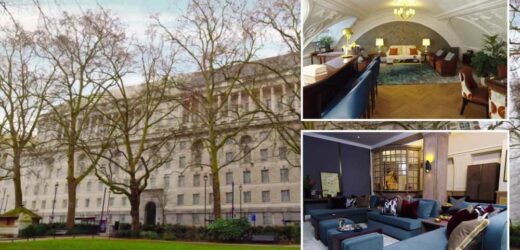A LONDONER pays just £200 a week to live like a billionaire in a luxury flat in a hugely sought-after location.
Kwame Agyekum, 34, a business management officer for the House of Commons, rents a one-bedroom flat in a new luxury development where apartments fetch up to £35million.
Millbank Residences, constructed between 1927 and 1929 and now a Grade II listed building, overlooks 'the Houses of Parliament and the River Thames'.
Within the Millbank Quarter property, one-bedroom flats are going for £1.75million, while studio apartments smaller than Agyekum’s flat are advertised for £3,350 a month.
Agyekum, who earns £34,500 a year, pays only £862.42 a month in rent because his flat is one of 13 affordable homes out of almost 200 apartments at the scheme.
The developer, Berkeley Group, was granted planning permission by Westminster city council on the condition it would provide for working Londoners under a section 106 agreement.
Read more Money News
Our newbuild estate has NO pavement – kids & OAPs have to walk on dangerous road
UK’s 20 cheapest areas to buy a home revealed…with homes from £117k
“The rent on the open market around here would be way more than all my salary a month,” Agyekum told the Guardian.
“I’m very, very, very fortunate to not only have an affordable rent scheme, but in such an incredible location and in such an incredible building. So I yeah, I couldn’t be more grateful.”
Agyekum, who grew up in Hammersmith, said there was 'no way at all' he could live in central London without the affordable housing, which are owned by affordable housing charity Dolphin Living.
What is a Section 106?
A Section 106 sets out the planning obligations between a local council and developers.
Section 106 refers to section 106 of the Town and Country Planning Act 1990, according to the government’s website.
Planning obligations run with the land and are legally binding.
Developers may be asked to provide contributions for infrastructure in a number of ways.
Developers can contribute towards the necessary infrastructure via the Community Infrastructure Levy, which is a fixed charge levied on new development to fund infrastructure, such as public roads, pavements and lighting.
They are usually used to support transport infrastructure improvements, although there have been examples of obligations being used to support training initiatives, environmental improvements and corporate aims, as well as to offset the impact of a development.
He also described how his mother asks him if he is living in a luxury hotel when she visits.
Most read in Money
Toys R Us to return to UK high streets in WEEKS – full list of locations revealed
I make £210,000 a year doing job that no one wants to do – I absolutely love it
Nando's makes major menu change & adds NEW item fans have wanted for years
Robert Dyas shoppers rush to buy 'fantastic' garden bar at £130 off
Agyekum said: “When she first came over she was like: ‘This does not feel like someone’s house. Are you sure it’s not a hotel?”’
Olivia Harris, the chief executive of Dolphin Living, said: "In his role working for the House of Commons, Kwame is the sort of working Londoner that the Dolphin Square Charitable Foundation was created to support.
"Over the last two years many key workers had to take lengthy commutes into the city while so many homes in the centre of capital sat empty.
"The pandemic has made us sit back and reconsider what we need from housing in London; it’s glaringly apparent that we need more affordable housing for key workers near to their places of work.
"Providing critical workers, like Kwame, with homes they can afford near to their places of work ensures that essential services and jobs can be undertaken, while ensuring those workers have a safe, reliable and reasonable commute."
Source: Read Full Article












